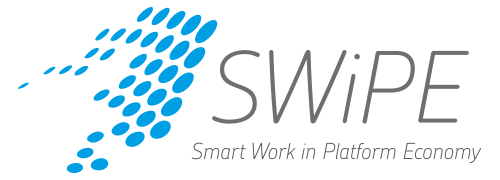Changes in working life and entrepreneurship in the platform economy are a central part of the SWiPE research project. The diversity of working life in the future underlines the importance of learning in work. Workers are expected to be able to continuously learn, adapt and adopt new skills and methods.
SWiPE Researchers Eveliina Saari and Anne Kovalainen together with Professor Stephen Billett, from Griffith University, Queensland, Australia, pondered the challenges of learning in work at a research seminar on the 7th of October organised by the SWiPE project and the Turku Centre for Labour Studies.
“The ways in which people participate in work are changing. In the future part-time work and contracting will be more common. In addition, work will more often be carried out somewhere other than the work place while at the same time it is expected that the number of working years will continue to increase. Digitalisation adds to the need to be able to assimilate abstract knowledge. In fact, in the future learning in work can be conceptualised as continuous change.” Says Professor Stephen Bilett. His presentation is available here.
Digitalisation creates new ways to working while reducing manual work. Especially, the fate of service occupations was a topic discussed in the seminar.
“What happens to work and workers in the digital age? What are the new jobs and how will they be created?” considers Professor Anne Kovalainen the seminar chair.
“Workers should be more involved in innovating their work. The era of digitalised services should be built hand in hand with customers and workers. After all, the role of workers in identifying new opportunities is important” Senior Researcher Evelina Saari describes in her presentation. Her presentation is available here.
Lively conversation touched upon important questions such as: how to prepare for a job that does not yet exist? Future work sets significant demands for both human resources activities and management. It is clear that management will play an important role in recognising new work and new roles as well as communicating these opportunities to workers. Naturally, workers themselves should be active in innovating their work.
Stephen Billett is Professor of adult and vocational education at Griffith University in Brisbane, Australia. He has many years of experience as an educator, researcher and developer of the Australian vocational educations system.
Eveliina Saari is a Senior Researcher at the Finnish Institute of Occupational Health while also being the programme director of both the Skilled Employeess – Successful Labour Market and the Health, Welfare and Lifestyles Academy of Finland – Strategic Research Council programmes. Eveliina Saari is also a researcher in the Smart Work in Platform Economy-consortium.
Anne Kovalainen is Professor of Entrepreneurship at the University of Turku and is the head of the Smart Work in Platform Economy (SWiPE) research project consortium.
